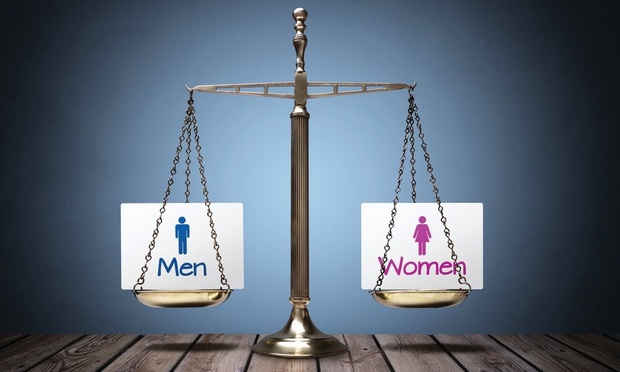Revealed: The Law Firms That Appear to Have Settled Sex Discrimination Claims
Seven top UK firms have had claims against them settled or withdrawn since 2017, according to a new database.
September 18, 2019 at 04:55 AM
3 minute read
 Credit: BrianAJackson/ThinkStock
Credit: BrianAJackson/ThinkStock
Seven top law firms appear to have settled sex discrimination claims since early 2017, according to analysis of an employment tribunal database.
Listings of claims filed against companies at U.K. employment tribunals show Clyde & Co, Dentons, DLA Piper, DWF, Kennedys, Linklaters and Ropes & Gray have faced sex discrimination claims during the period. DWF had two such claims.
In all cases, the claims were "dismissed on withdrawal" from the claimant, which typically means a settlement has been reached, according to employment partners. Not one of the claims made it to trial.
Shoosmiths also faced a sex discrimination claim that was withdrawn, but the firm said it was not settled and that the sex discrimination part of the dispute was made in error and withdrawn by the claimant's lawyer. Legal Week was unable to contact the claimant.
Paul, Weiss, Rifkind, Wharton & Garrison is currently facing a claim, the database showed, and Simmons & Simmons had a claim against it dismissed because the claim was not made in the jurisdiction of the tribunal, according to the filings.
In total, the public database has recorded 3,858 sex discrimination claims filed against companies at U.K. employment tribunals since February 2017.
Clyde & Co, DLA Piper, Dentons, DWF, Linklaters, Ropes & Gray and Simmons & Simmons declined to comment. Paul Weiss confirmed the claim was ongoing but declined to comment further. A Kennedys spokesperson said: "Kennedys takes all form of harassment and discrimination extremely seriously."
In June, a House of Commons committee published a report criticising the use of non-disclosure agreements (NDAs) and settlement payments by employers facing claims, as they "prevent the employee from speaking about the alleged behaviour – even unlawful behaviour – without those allegations ever being investigated and without any sanctions for perpetrators".
Last year, the committee also called for lawyers who misuse NDAs to silence victims of sexual harassment to face "serious sanctions".
In March last year, the Solicitors Regulation Authority (SRA) issued a warning notice on the use of NDAs, with a stipulation of what it considered to be an improper use of the agreements.
The regulator said that if a lawyer or a law firm uses an NDA "as a means of preventing, or seeking to impede or deter, a person from reporting misconduct, or a serious breach of our regulatory requirements to us", or to a law enforcement agency, including the police, then its use was improper.
The notice also states: "NDAs or other settlement terms must not stipulate, and the person expected to agree the NDA must not be given the impression, that reporting or disclosure as set out above is prohibited."
Earlier this year, Allen & Overy employment partner Mark Mansell was referred to the Solicitors Disciplinary Tribunal for his role advising Miramax, which Harvey Weinstein co-founded, in 1998 when the disgraced producer's then-assistant Zelda Perkins accused him of sexual harassment.
It emerged last year that the NDA drawn up by Mansell set out a provision that appeared to limit Perkins' ability to make disclosures in cases of civil or criminal legal processes.
This content has been archived. It is available through our partners, LexisNexis® and Bloomberg Law.
To view this content, please continue to their sites.
Not a Lexis Subscriber?
Subscribe Now
Not a Bloomberg Law Subscriber?
Subscribe Now
NOT FOR REPRINT
© 2025 ALM Global, LLC, All Rights Reserved. Request academic re-use from www.copyright.com. All other uses, submit a request to [email protected]. For more information visit Asset & Logo Licensing.
You Might Like
View All

Jones Day, BCLP & Other Major Firms Boost European Teams with Key Partner Hires
4 minute read
$13.8 Billion Magomedov Claim Thrown Out by UK High Court
Trending Stories
- 1South Florida Attorney Charged With Aggravated Battery After Incident in Prime Rib Line
- 2'A Death Sentence for TikTok'?: Litigators and Experts Weigh Impact of Potential Ban on Creators and Data Privacy
- 3Bribery Case Against Former Lt. Gov. Brian Benjamin Is Dropped
- 4‘Extremely Disturbing’: AI Firms Face Class Action by ‘Taskers’ Exposed to Traumatic Content
- 5State Appeals Court Revives BraunHagey Lawsuit Alleging $4.2M Unlawful Wire to China
Who Got The Work
J. Brugh Lower of Gibbons has entered an appearance for industrial equipment supplier Devco Corporation in a pending trademark infringement lawsuit. The suit, accusing the defendant of selling knock-off Graco products, was filed Dec. 18 in New Jersey District Court by Rivkin Radler on behalf of Graco Inc. and Graco Minnesota. The case, assigned to U.S. District Judge Zahid N. Quraishi, is 3:24-cv-11294, Graco Inc. et al v. Devco Corporation.
Who Got The Work
Rebecca Maller-Stein and Kent A. Yalowitz of Arnold & Porter Kaye Scholer have entered their appearances for Hanaco Venture Capital and its executives, Lior Prosor and David Frankel, in a pending securities lawsuit. The action, filed on Dec. 24 in New York Southern District Court by Zell, Aron & Co. on behalf of Goldeneye Advisors, accuses the defendants of negligently and fraudulently managing the plaintiff's $1 million investment. The case, assigned to U.S. District Judge Vernon S. Broderick, is 1:24-cv-09918, Goldeneye Advisors, LLC v. Hanaco Venture Capital, Ltd. et al.
Who Got The Work
Attorneys from A&O Shearman has stepped in as defense counsel for Toronto-Dominion Bank and other defendants in a pending securities class action. The suit, filed Dec. 11 in New York Southern District Court by Bleichmar Fonti & Auld, accuses the defendants of concealing the bank's 'pervasive' deficiencies in regards to its compliance with the Bank Secrecy Act and the quality of its anti-money laundering controls. The case, assigned to U.S. District Judge Arun Subramanian, is 1:24-cv-09445, Gonzalez v. The Toronto-Dominion Bank et al.
Who Got The Work
Crown Castle International, a Pennsylvania company providing shared communications infrastructure, has turned to Luke D. Wolf of Gordon Rees Scully Mansukhani to fend off a pending breach-of-contract lawsuit. The court action, filed Nov. 25 in Michigan Eastern District Court by Hooper Hathaway PC on behalf of The Town Residences LLC, accuses Crown Castle of failing to transfer approximately $30,000 in utility payments from T-Mobile in breach of a roof-top lease and assignment agreement. The case, assigned to U.S. District Judge Susan K. Declercq, is 2:24-cv-13131, The Town Residences LLC v. T-Mobile US, Inc. et al.
Who Got The Work
Wilfred P. Coronato and Daniel M. Schwartz of McCarter & English have stepped in as defense counsel to Electrolux Home Products Inc. in a pending product liability lawsuit. The court action, filed Nov. 26 in New York Eastern District Court by Poulos Lopiccolo PC and Nagel Rice LLP on behalf of David Stern, alleges that the defendant's refrigerators’ drawers and shelving repeatedly break and fall apart within months after purchase. The case, assigned to U.S. District Judge Joan M. Azrack, is 2:24-cv-08204, Stern v. Electrolux Home Products, Inc.
Featured Firms
Law Offices of Gary Martin Hays & Associates, P.C.
(470) 294-1674
Law Offices of Mark E. Salomone
(857) 444-6468
Smith & Hassler
(713) 739-1250









